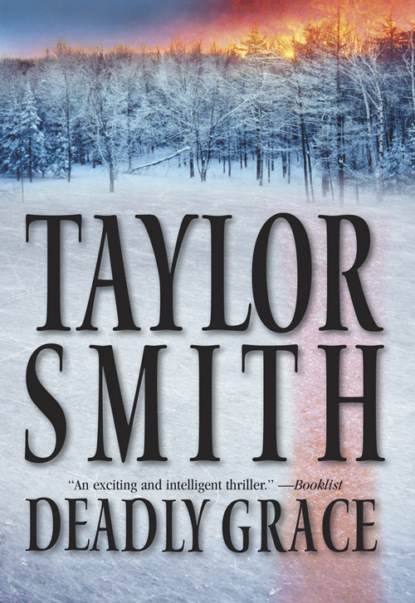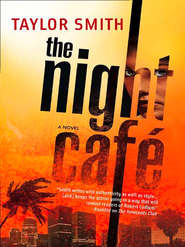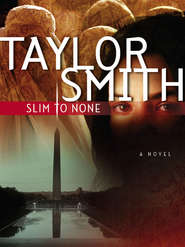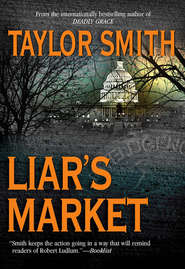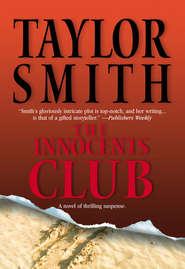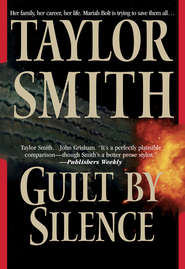По всем вопросам обращайтесь на: info@litportal.ru
(©) 2003-2024.
✖
Deadly Grace
Автор
Год написания книги
2018
Настройки чтения
Размер шрифта
Высота строк
Поля
They continued down a long narrow hall, past rooms with heavy doors that stood open now, each room with a rectangular observation port, about two feet by three, set into the wall to allow a view of the inside. By the faintly shadowed look of the windows, Cruz knew they were mirrored on the other side, like the observation windows of the countless interrogation rooms in which he’d worked witnesses over the years. Most of the rooms were empty now, their occupants obviously those geriatric cases down the hall, but they passed one closed door, and through the observation window, they saw a lanky, long-haired boy lying in a knot of covers, his body twitching as if in response to a thousand small electric shocks.
“Drug overdose,” Kandinsky said, frowning at the boy’s spasms. “Sixteen years old. He’s three days into detox. This is his third time trying to get clean, and if he doesn’t straighten up and fly right this time, I don’t think he’s going to see seventeen.” She shook her head wearily. “A nice kid from a good home. Such a stupid, bloody waste. He’s the only other patient on total lock-down and round-the-clock watch.”
They moved on to the last room in the hall, and the doctor’s voice dropped to a murmur. “There she is.”
“Oh, Jesus!” Berglund breathed, his pale eyes gone wide.
Cruz turned to the window. He, too, was taken aback. He had Jillian Meade’s passport details, and from them, he’d begun to form a mental picture of her. Hair: brown. Eyes: brown. Height: 5'5". Weight: 110 pounds. Place of birth: Drancy, France, July 14, 1944.
All this information was contained in his battered briefcase in the trunk of the rental car, which was still parked back at Havenwood police headquarters. He’d also seen her in the Bicentennial group photograph hanging on Haddon Twomey’s wall, and there was another photo in his briefcase, as well, clipped to the corner of her file. The State Department had sent over a grainy copy of her passport photo, but it was clear enough to put some flesh on the bones of the other details he’d gathered. Hair not just brown, but very dark; long, below her shoulders at least, although she’d worn it center-parted and tied back conservatively for her passport picture. A wisp of long bangs, like a curtain, half concealing eyes that were large and slightly almond shaped. Her expression sober, chin tilted up slightly, as if she’d instinctively recoiled from the intrusive stare of the lens, the angle leaving the impression of someone looking down a nose that was unremarkable, neither too large nor too small. Her unsmiling mouth had been full, deeply colored, probably from lipstick, although it was hard to tell, since the picture was black and white. She wore small gold earrings and a simple gold necklace against a plain, rounded black neckline.
From those details and from the other information Cruz had gathered about her yesterday, as he’d gone from her apartment building to her workplace, he’d formed an image of a woman who was quiet, intellectual, buttoned-down and caught up in her work. Not unpleasant, but the kind who, as she approached middle age, rarely made eye contact, as if afraid of catching some fatal disease through the osmosis of social intercourse. A woman who might smile out of manners or nervousness, but who rarely laughed out loud. A thin woman with pale hands that never got dirty. A woman who haunted library stacks and hurried home each night from her museum job to a quiet, tidy apartment where she survived on yogurt, apples and three good books a week.
The problem was, that image didn’t mesh with the reality of a woman linked to three violent deaths. And it certainly didn’t fit with the image in the viewing port in front of them.
The room was painted a dull green color, furnished with a hospital bed, a steel chair and a rolling side table. Nothing more. The foot of the bed faced the window, so that although the woman lay on her side, propped on one elbow, they could see her in profile. She was wearing an oxygen feeder tube, and her breathing seemed raspy and labored. Her long legs were bare and bruised, tangled in the quilt but folded up in a near fetal position making her seem small, childlike and lost in the big institutional bed. Her face was strained and pale, eyes puffy, skin smeared with traces of soot. Her long hair was tangled and falling unheeded in her eyes. Thin arms poked from the short sleeves of a blue cotton hospital gown; like her legs, they seemed covered with bruises—although maybe, Cruz thought, it was only soot. There was, however, no mistaking the thick, gauze bandage on her left arm, just below the elbow, the aftermath, he presumed, of the incident with the air-filled hypodermic syringe.
Scattered on the mattress beside her were the spilled contents of a box of felt markers. Her right hand clenched one of the markers as she scribbled, rapidly and frantically, in a thick notebook, pausing only to flip pages. She was supporting herself on her left elbow as she lay on the bed, and that hand was compulsively kneading a corner of the quilt. Cruz watched the counterpoint movements, mesmerized by her left hand clawing at the covers while her right went on, scribbling and scribbling—down the notebook’s left-hand page, then flying to the top of the right, madly filling that one, and then flipping to the next. She worked with a frenzy that left him inclined to believe she was truly insane. And at that speed, he thought, she had to be writing gibberish.
So was she mad? Or too clever by half?
“She looks awful,” Berglund muttered. “Locked up in there, all alone. Isn’t there something…?”
“We’re doing all we can for her right now,” Kandinsky said. “At this point, the most important thing seems to be that she get down in that notebook whatever it is that she seems driven to put there. That and, hopefully, for her to sleep, and also to eat something. I might see if we can get her into a shower eventually, too. I know that would make her feel better. But right now,” she added, “this is what she needs to be doing.”
Berglund couldn’t seem to take his eyes off the crumpled figure on the bed. The doctor watched him for a moment, her face shifting to a puzzled frown, and then she reached out to touch him on the arm. “Deputy? Why don’t you and Agent Cruz go now? You can come back tomorrow and we’ll see where we stand then. She’s not going anywhere, and I’m sure you’ll find her much improved after a night’s sleep.”
Berglund snapped back to attention, pulling his gaze away from the window. “Right, that’s what we’ll do. I’d like to know right away if her condition changes, though,” he added, pulling out a business card, and then a pen that he used to scribble a number on the back. “These are my office and home telephone numbers. Would you tell her I was here, if you get a chance? And if she wants to talk, any time, no matter how late, call me?”
Kandinsky took the card he held, looked it over, and then slipped it into her sweater pocket. “I will, I promise.”
Berglund studied her for a second, then turned on his heel and headed up the hall without a backward glance.
Cruz took one last look at the figure on the other side of the glass. Jillian Meade’s one hand continued its frantic kneading of the bedclothes while, clenched in her other, the turquoise marker flew across the notebook pages.
CHAPTER 9
I don’t know where to begin to tell this story. I lie here, searching for meaning in what happened, finding none that makes any sense. At the very least, I need to lay this out in a logical sequence of events, but I’m so confused by guilt and anger I can hardly think straight.
How do I do this? How do I explain why a woman as admired as my mother had to come to the end she did? And how do I account for the sick, twisted fate that forced me, a daughter as fatally flawed as she was, to sit in judgment over her?
I want to scream out at the unfairness of it. My throat and chest ache with the pressure of unshed tears, the way a dam must ache as it holds back a flood. But I can’t indulge myself. I haven’t earned the right to cry.
One thing seems clear: if I’m going to get this all down, I’m going to have to try to muster up some kind of detachment. Treat Grace Meade as just another one of my research subjects, a minor historical figure upon whom a handful of fates turned. Ignore the emotion-laden tie that binds us even now—that soft, invisible umbilical cord that’s been wrapped around my neck since the day I was born, slowly strangling the life out of me.
And who knows? Maybe it strangled both of us. For years now, I’ve harbored the guilty feeling that my mother would have been happier if I’d never been born. That the burden of my childish needs forced her to abandon any thought of pursuing her own. That ensuring my security destroyed any chance she might have had to find a little happiness of her own.
She left her country and the life she knew to bring me here to live with my father’s parents. I can’t remember a time when my grandparents weren’t the most loving influence on my life, and I will always be grateful for the safe cocoon of their warmth. I’m certainly glad they’re not alive now to see how I’ve ended up.
In spite of my grandparents’ unswerving love and support, though, there was a sadness that permeated our home like a layer of fine dust. Now and then, it lifted a little, but inevitably it would soon settle back over us all.
My late father was Nana’s and Grandpa’s only child, and of course, no worse tragedy can befall a parent than to lose a child. Now, as I look back through adult eyes, I can see how my young life was marked by the faint shadow of grief behind their encouraging smiles. Every milestone I passed successfully must have reminded them of that other child they’d nurtured safely through the pitfalls of childhood, only to have him perish alone in a foreign land.
And my mother? His shadow seemed to hang over her, too, and I sometimes felt she could barely make me out in the gloom of those memories. When I was little, there were moments when I wanted to fly into a room and just crash into her—anything to break through, to get her to notice me. But fear or training or both held me back. I waited, watching and hoping she would turn on me the radiant, incredible smile that she bestowed like a blessing on so many others who came to love and admire her. She never did—at least, not when we were by ourselves and I could be absolutely certain that she meant it for me and me alone.
For years, I thought the problem was that I reminded her too much of my father, whose silver-framed photograph smiled down on us from the living room mantle. That my existence was a constant, aching reminder of his absence. In recent years, though, I resigned myself to the possibility that she might simply have been one of those women who didn’t enjoy motherhood. I even wonder whether she’d ever really wanted a child. She never said, but I can’t help thinking that I was an accident with which she simply coped, just as she coped with all the other setbacks and tragedies in her life. There is nothing worse than thinking your very existence is a mistake.
Mind you, I’m sure all of Havenwood would testify that she was a model parent, utterly conscientious. As a child, I adored her and lived in terror of losing her. But as I grew older, I began to realize that her life might have been so much more had she not sacrificed herself for my sake—buried herself alive in this tiny prairie town where her experience and skills would always be underutilized, her past little understood, no matter how much she was admired.
I knew—everyone knew, vaguely—how her life before coming to this country had been full of action, danger and passion, like something out of great fiction or the movies. Living on the front lines of World War II, plunged right into the action, she’d been part of one of the greatest struggles between good and evil the world has ever known. Lines were clearly drawn then, more so than at any time before or since. For my mother’s generation, there was the evil of fascism on one side and all those who opposed it on the other. As a partisan, she led a life of action and passion—and unthinkable tragedy. But when the battle for freedom was won, she retired with me, her infant daughter, to a remote and foreign place, the small hometown of the husband she’d found, then lost in the midst of that great struggle.
I can’t believe she wasn’t sometimes bored to utter despair here. Bored and lonely. And yet, to my knowledge, she never considered packing up and moving someplace else where she might at least attend a concert or a stage play from time to time, perhaps find someone—a friend, lover, or new husband—whose interests went beyond grain prices, TV shows, local gossip and the winter windchill factor. Someone to understand her and share her life.
I remember the first time it really dawned on me that my mother had once had a life beyond Havenwood. It was after both my grandparents had died; I must have been twelve or thirteen at the time. My mother and I were at home one evening, watching an old movie on television. I don’t remember which one. All I know is that it was set on one of those elegant British estates that hardly exist anymore and that the entire cast spoke like my mother. And it suddenly struck me there might actually be a place on this earth where Grace Meade didn’t stand out like a mink coat at Woolworth’s.
I remember, too, glancing over at her and being thunderstruck by the realization that she could cry.
“Mum? What’s wrong?” I asked her—panicked really, because this was so unlike her.
Her ivory linen handkerchief fluttered in an embarrassed little wave. “Oh, nothing, darling. I’m sorry. I don’t know what’s come over me.”
“What do you mean? What’s wrong?”
She hesitated, glancing at the television, but Deborah Kerr (I think that’s who it was) had given way to Tony the Tiger and a Frosted Flakes commercial. My mother’s porcelain blue eyes, brimming with tears, turned back to me, two points of color standing out on her cheekbones, which were high and smoothly defined. Although her face became a little softer and rounder as she aged, she was beautiful right up to the day she died.
“It’s silly, really,” she said. “I suppose I was just feeling a little homesick.”
“Homesick? You were?”
I was dumbstruck. The thought had never occurred to me that she might wish to be anywhere but where we were. She did have an airmail subscription to the Daily Mail and the Times of London, of course, and she kept a short-wave radio in her bedroom so that she could listen to the BBC. We had a tradition in our house that on December 25, we had to wait until after the Queen’s Christmas message before my mother would come out and join my grandparents and me in opening our gifts around the tree.
But those were just my mother’s strange little quirks. I’d never thought of her as a particularly sentimental person. She almost never spoke of her life before coming to Minnesota. Like most overconfident Americans, I simply assumed that she was thrilled to be here.
As I grew older, though, it dawned on me that her reluctance to revisit the past mightn’t be lack of sentimentality as much as her way of coping. After all, she’d endured terrible losses in those years before I was born—her parents, a fiancé, my father, her home, not to mention God knows how many friends and comrades from her period of war service.
Was it any wonder, then, that the subject of the past would be painful for her.
“Do you miss England, Mum?”
“Sometimes, yes, I suppose I do,” she confessed.
“Are you sorry you left?”
“No, not really. There’d be no point in being sorry, would there? Always remember, Jillian, once you make a decision, you must never look back.”
“You could have stayed there,” I pointed out, intrigued at the idea that I might have had an entirely different life, one in which I went to a school that looked like an old castle and wore a school uniform with a kilt, knee socks and a crested blazer. Mentally, I tried on an English accent, picturing myself as a more gangly, less pretty (obviously) version of Elizabeth Taylor in National Velvet.
But my mother’s head gave a firm shake. “No, darling. Coming here was the best option at the time. Things were terribly difficult at home when the war ended. You were a tiny baby, so you can’t remember what it was like, but I remember it very well, indeed. We were living in one cramped little room in an old house outside London. It was hardly big enough for a bed and a small table. Your cradle was an old bureau drawer. We needed a flat desperately, but there were simply none to be had. So many houses had been bombed by the Germans, and with all the men coming back from the front after 1945, there was a dreadful shortage of housing. Naturally, war veterans were at the top of the waiting list, so there was no telling how long we would have to live like that. It was no way to raise a child.”





